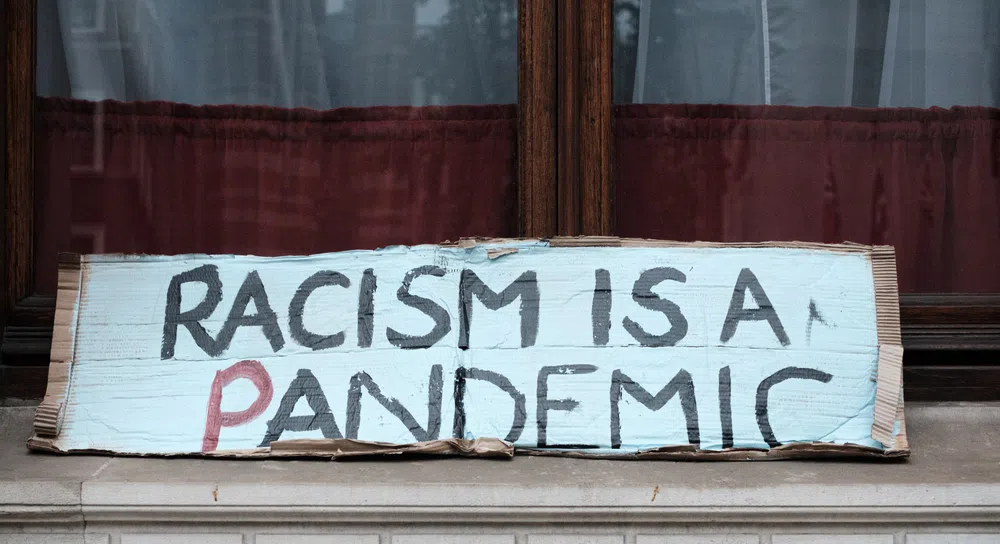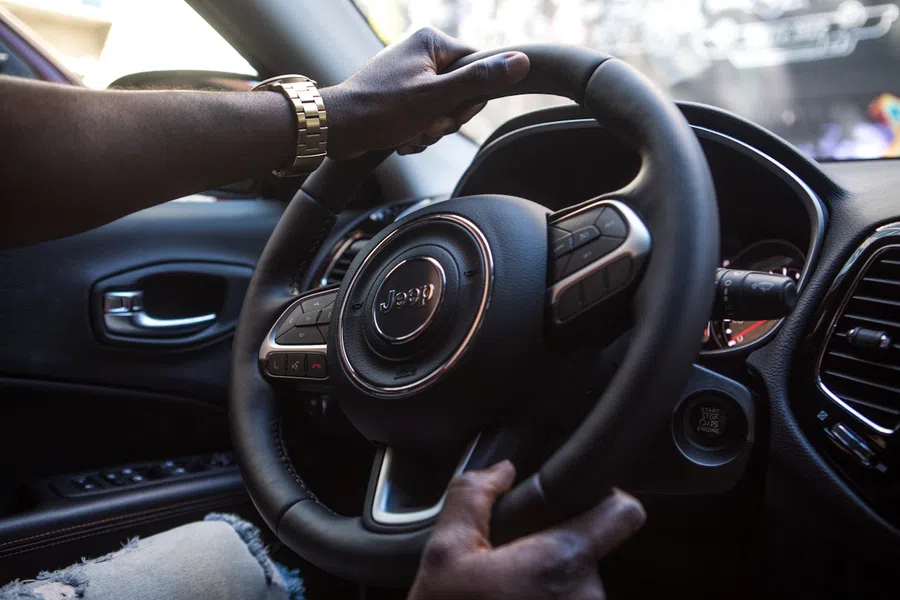Native Son Author: Richard Wright
Richard Wright was born in 1908 at Rucker's Plantation in Mississippi. Both of his grandfathers were born into slavery and fought for their freedom in the Civil War. Growing up in the Jim Crow South, Wright was subject to violence and racism from a young age. As he grew up, he was especially concerned with the lack of educational opportunities afforded to African Americans. Wright didn't experience a full year of schooling until he was a teenager, and he was kept from reading certain books because of his race.
Much of Wright's writing was informed by his experience growing up as a young Black man in white-dominated America. Racial tension between white and Black Americans and the oppression of Black people at the hands of white society are two of the most common themes in Wright's work. His work often features Black characters that clash with the oppression and violence of white society.

Fig. 1: Wright's writing was influenced by the racism and oppression he faced growing up as an African American in the Jim Crow South.
The drastic impact racism has over Black lives is apparent in Native Son, in which a young Black man is demonized and hunted down after accidentally killing a white woman. Wright's writing condemns American society for pushing violence and segregation on the Black narrative when the unfair system predetermines Black fate.
Native Son Summary
In 1930s Chicago, Bigger Thomas lives in a one-room apartment with his mother and younger siblings in an overcrowded and neglected Black neighborhood. The apartment is infested with rats, and Bigger beats one to death with a frying pan before heading out to see his friends. His mother reminds him he has a job interview with a wealthy white man named Mr. Dalton later that day, but Bigger resents having to provide for his family and trying to survive within the parameters of a dominant white society. Despite his mother's warnings not to, Bigger meets up with his gang at Doc's pool house.
The novel is set after slavery was legally abolished (1865) but before the Civil Rights movement formally started in 1954.
Bigger and his friends are bitter about the racism and poverty that is an everyday part of their lives. Bigger wishes he could one day be an aviator but realizes that is impossible since African Americans aren't given the education or opportunities needed to be successful. Instead, he and his friends rob Black-owned stores to support their families. They stay away from white businesses out of fear of the steep repercussions.
Enraged by the morning's disagreement with his mother, Bigger suggests robbing Blum's Deli, a small white-owned business. His friends are apprehensive, and Bigger pulls a knife on them when they refuse to go along with the robbery. Bigger is thrown out of Doc's and makes his way to his interview.
Bigger interviews to be a chauffeur to the Daltons, a wealthy white family. Mr. Dalton is a real estate baron and considers himself altruistic because he hires poor Black men to work for him. In reality, however, Dalton is Bigger's landlord, and he reinforces segregation and discrimination by forbidding African Americans from living in nicer neighborhoods. He forces families like Bigger's into overcrowded apartments and makes it impossible to work towards a better life.

Fig. 2: Bigger is hired to drive the Daltons as their chauffeur.
He is given the position despite Bigger's nervousness and what he believes to be a bad interview. His two responsibilities are to drive the Daltons around and tend to the wood furnace. Bigger's first task is to drive Dalton's college-aged daughter, Mary, to her university lectures. When Mary gets in the car, however, she ditches school and has Bigger pick up her boyfriend, Jan Erlone. Jan is an ardent Communist and Mary is a Communist sympathizer, much to her parents' dismay. Mary and Jan want to prove they are progressive by being kind to Bigger and ignoring society's expectations about race.
Their kindness only makes Bigger uncomfortable as he realizes he could get in trouble for being with a white woman and man in an improper manner. Despite his unease, Jan and Mary force Bigger to take them to a restaurant in Chicago's predominantly Black South Side. Bigger, Mary, and Jan all get drunk. Bigger drives around while Mary and Jan kiss in the back seat. Then Bigger drops Jan off and returns to the Dalton household.
Mary is unconscious, and Bigger must carry her into her bedroom. As soon as he gets Mary in bed, Mrs. Dalton, Mary's blind mother, walks into the room. Bigger worries Mary will accidentally say something about him being in the room in her drunken stupor. He covers Mary's face with a pillow to keep her from talking and accidentally smothers her. When Mrs. Dalton leaves and Bigger realizes what has happened, he takes Mary's body downstairs, chops up her body, and burns it in the furnace to avoid being caught. He then returns home in a daze.
Mrs. Dalton's blindness is a metaphor for racial blindness. The Daltons believe they are progressive because they employ Black people. They don't realize, however, that their business practices systematically limit African Americans in Chicago by keeping them segregated and confined to poor areas.
The Daltons also think Bigger should feel grateful to be working for them, but they are blind to the fact that employing a Black man as their servant is perpetrating the idea that African Americans should serve white Americans. They claim not to see color, which only ignores Bigger's experience as a Black man.

Fig. 3: Bigger suffocates Mary with a pillow.
The next morning when Bigger gets to work, Mr. and Mrs. Dalton reveal Mary is missing. Bigger places the blame on Jan to cover up his crime and even writes a ransom note, signing it "Red" so the Daltons will think a Communist kidnapped their daughter. In his anonymous letter, Bigger demands $10,000 in exchange for Mary's return. The Daltons are willing to meet the demands, but small pieces of bone are found in the furnace that reveal Mary is dead. Bigger becomes the target of an intense police chase.
Native Son is set in the 1930s, shortly after the First Red Scare when fear of Communism spread throughout the United States. American authorities worried about a Communist uprising, especially as the American Labor Movement gained momentum, demanding better wages, safer conditions for work, and the formation of unions.
Terrified, Bigger flees to his girlfriend Bessie's house and tangles her up in his crime. Bessie is scared when Bigger tells her about the murder, but he threatens her into fleeing with him. They escape to an abandoned warehouse to hide from the seemingly thousands of police officers that are chasing Bigger. Bigger is scared Bessie will betray him to the cops. He rapes her and then smashes her head with a brick.
Bigger stays on the run as long as he can. Meanwhile, a vigilante mob of white citizens begins terrorizing Black families in the South Side. The newspapers have portrayed Bigger as a rapist and murderer, igniting racial tensions in Chicago. Bigger is eventually caught after an intense shootout and taken to prison. Angry white mobs demand retribution for his crimes even before his trial begins.

Fig 4: The belligerent white mob demands Bigger be brought to justice.
Although Jan is upset about Bigger killing Mary and then trying to pin the blame on him, he introduces Bigger to Boris Max, a lawyer who sympathizes with Bigger. Max realizes Bigger is likely doomed to the death penalty but works hard to get him life in prison instead.
Max gives an impassioned speech to the jury about Bigger being a product of America's inherent system of racism and prejudice. Bigger's existence, Max argues, was doomed from the beginning since African Americans cannot prosper in a system built to keep them oppressed. In this way, Bigger is a "native son," doomed to repeat the same cycle of violence he was born into. Despite Max's best efforts, Bigger is sentenced to death. In the final scene of the novel, Bigger thanks Max and tells him goodbye.
Native Son Characters
Native Son primarily centers around Bigger Thomas, a poor Black man who cannot navigate the prejudice and oppression of white society. Other significant characters include Mary Dalton, who Bigger accidentally murders, and her boyfriend, Jan Erlone, who Bigger attempts to pin the crime on because of his Communist leanings.
Bigger Thomas
The protagonist of the novel, Bigger Thomas is easy to sympathize with but difficult to like. Bigger is a 20 years old Black man living in Chicago in the 1930s. He is struck by how African Americans are kept oppressed by a lack of opportunities and education. Bigger believes America is inherently racist and unequal, which makes him bitter.
At the novel's beginning, Bigger engages in petty crimes and lives with his family in a rundown apartment. He takes a job as a chauffeur to a wealthy white family, but his ordinary life as a subordinate Black man is ripped apart when he accidentally kills his employer's daughter. Bigger doesn't necessarily like hurting people, but it gives him a sense of power that he has never known as a Black man in oppressive white America. He rapes and kills his girlfriend before being captured, arrested, and sentenced to death for his crimes.
Mary Dalton
The daughter of the wealthy Mr. and Mrs. Dalton, Mary Dalton considers herself progressive and rebels against her parents' conservative nature. She dates a Communist and ignores social boundaries between Black men and white women. Although she means well, Mary ignorantly puts Bigger in danger by forcing him to break societal expectations of a Black man as well. Mary dies when Bigger accidentally suffocates her so she won't reveal their interactions to her mother.
Jan Erlone
Mary Dalton's Communist boyfriend, Jan Erlone lectures Bigger about Communism and equality while Bigger drives. Mr. and Mrs. Dalton dislike Jan or his progressive politics, making it easy for Bigger to blame Jan for Mary's disappearance. Jan eventually realizes that ignoring social boundaries would only make life worse for Bigger, and Jan introduces Bigger to a lawyer to try to save his life.
Bessie Mears
Bigger's girlfriend, Bessie Mears is a young Black woman who struggles with alcoholism. Their relationship is not built on mutual love and respect, and Bigger manipulates Bessie into going on the run with him. Bigger rapes Bessie and murders her because he believes she may become a liability.
Mr. and Mrs. Dalton
Bigger's wealthy employers, Mr. and Mrs. Dalton hire Bigger as their chauffeur. The Daltons claim to be altruistic in employing young Black men. In reality, they keep Black families oppressed and subordinate by dictating where they can and cannot live and limiting their opportunities. Mr. and Mrs. Dalton profit from exploiting their Black tenants and care more about money than the people who live in their overpopulated, dilapidated neighborhoods.
Boris A. Max
A Jewish lawyer, Boris A. Max works closely with the Communist party. He takes on Bigger's case at Jan's request and works hard to defend Bigger by arguing he is merely a product of a society riddled with racism. Despite his passion and dedication, Max cannot save Bigger's life.
Native Son Analysis
Native Son serves as a piece of social commentary as Wright criticizes how American society systematically limits the lives of Black Americans with racism and inequality. Neither Wright nor Max condone Bigger's behavior or justify his crimes. Instead, Max underscores the foundation of the African American experience to show how oppression and prejudice are built into the pillars of American society.

Fig. 6: Even after slavery is abolished, American society profits off the exploitation of African Americans.
Since American society was built on the backs of Black Americans, it was never made to support them or their needs. Even after the end of slavery, white businessmen and politicians get rich by exploiting their Black counterparts. In a system defined by inequality, Max argues, African Americans are destined to a fate of violence and limitation. They are not given any opportunities to better their lives and chase the American dream and are trapped in a cycle where they are always used and abused.
It is under these conditions that Bigger—a stereotypically uneducated, violent Black man—is born. Max does not argue that Bigger is innocent. Instead, he argues Bigger was the unfortunate product of a society that teaches Black men they will never be as successful as white men. Bigger resorts to violence because it is the only way he knows how to survive. Instead of being given help and a fair opportunity to better himself, Bigger has to fight tooth and nail for what little he has. Max argues that Bigger is a "Native Son" of America, a product of a society built to exclude his interests.
Native Son Quotes
Below are some of the most important quotes in Native Son.
There was something he knew and something he felt; something the world gave him and something he himself had. . . . [N]ever in all his life, with this black skin of his, had the two worlds, thought and feeling, will and mind, aspiration and satisfaction, been together; never had he felt a sense of wholeness." (Book Two: Flight)
At the start of the novel, Bigger doesn't feel like he is truly in control of himself. He feels he's split into two people and will never be whole. Tragically, it isn't until after he's committed murder that Bigger learns how to assume control of his life.
If only ten or twenty Negroes had been put into slavery, we could call it injustice, but there were hundreds of thousands of them throughout the country. If this state of affairs had lasted for two or three years, we could say that it was unjust; but it lasted for more than two hundred years. Injustice which lasts for three long centuries and which exists among millions of people over thousands of square miles of territory, is injustice no longer: it is an accomplished fact of life...What is happening here today is not injustice, but oppression..." (Book Three: Fate)
In this quote, Max explains how the United States doesn't just allow injustice to happen: it was built off the exploitation of certain groups of people, making oppression an inherent aspect of American society.
Native Son - Key takeaways
- Native Son was written by Richard Wright.
- The grandson of former slaves, Wright grew up in the Jim Crow South. The racism, oppression, and violence he witnessed greatly impacted his writing.
- Native Son centers around a poor African American man demonized by the public and sentenced to death after accidentally killing a white woman.
- Native Son is a social commentary criticizing how American society was built off oppression and condemns Black men and women to live violent, stunted lives.
- The most important themes in the novel are racism and oppression.















